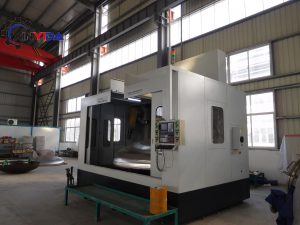CNC polishing machines represent a significant advancement in manufacturing technology, combining precision and automation to enhance the surface quality of various components. These machines are indispensable in industries where the finish of the product is crucial, from automotive to aerospace and medical equipment. Understanding the basic components and functions of CNC polishing machines is essential for optimizing their use and ensuring high-quality results.
Basic Components of CNC Polishing Machines
Control System
Description and Role: The control system is the brain of a CNC polishing machine. It manages the machine’s operations, ensuring that every polishing task is executed with high precision.
Types of Control Systems: CNC machines typically use two main types of control systems—PLC (Programmable Logic Controller) and PC-based controllers. PLCs are favored for their reliability and real-time processing capabilities, while PC-based systems offer more complex programming options and better user interfaces.
Polishing Head
Types of Polishing Heads: The polishing head is the part of the machine that interacts directly with the workpiece. Common types include belt, brush, and abrasive heads.
Function and Adjustment: The polishing head’s function is to apply abrasive materials to the surface of the tube, removing imperfections and achieving the desired finish. Most machines allow for adjustment of the head’s pressure, speed, and angle to accommodate different polishing requirements.
Work Table or Fixture
Types: Work tables or fixtures come in various forms, such as fixed or rotary. Fixed tables hold the workpiece in a stationary position, while rotary fixtures enable the workpiece to rotate during polishing.
Function in Holding and Positioning: The work table or fixture ensures that the tube is held securely and positioned correctly during the polishing process. This stability is crucial for achieving a uniform finish.
Drive Mechanism
Types of Drives: CNC polishing machines use various drive mechanisms, including servo motors and stepper motors. Servo motors provide high precision and smooth operation, while stepper motors offer reliability and cost-effectiveness.
Function and Importance: The drive mechanism controls the movement of the polishing head and work table, directly affecting the machine’s accuracy and efficiency. A high-quality drive system ensures precise and consistent results.
Cooling System
Types: Cooling systems in CNC polishing machines can be air-based or liquid-based. Air cooling is typically used for lighter applications, while liquid cooling systems are employed for more intensive operations.
Function in Maintaining Optimal Performance: Cooling systems prevent overheating of components, which can degrade performance and reduce the lifespan of the machine. Proper cooling ensures that the machine operates efficiently and maintains high-quality output.
Sensors and Feedback Systems
Types of Sensors: CNC polishing machines are equipped with various sensors, including position sensors and force sensors.
Role in Accuracy and Quality Control: These sensors provide real-time data on the machine’s operation, allowing for adjustments and ensuring that polishing is done according to the set parameters. This feedback helps maintain the accuracy and consistency of the polishing process.
Functions of CNC Polishing Machines
Automated Polishing
Explanation of Automation: Automation in CNC polishing machines significantly enhances efficiency by reducing manual intervention. The machine can perform repetitive tasks with high speed and accuracy, which is particularly beneficial for large-scale production.
Precision Control
Role of CNC Technology: CNC technology allows for precise control over polishing operations, including speed, pressure, and movement. This precision is crucial for meeting exact specifications and achieving high-quality finishes.
Versatility in Operations
Handling Various Shapes and Sizes: CNC polishing machines are versatile and can handle a wide range of tube shapes and sizes. This flexibility makes them suitable for diverse applications across different industries.
Consistency in Finish
Ensuring Uniform Quality: One of the key advantages of CNC polishing machines is their ability to deliver a consistent finish. Automated systems reduce the variability that can occur with manual polishing, ensuring that each product meets the same high standards.
Customization and Programming
Ability to Program: CNC machines can be programmed to execute specific polishing patterns and parameters. This capability allows for customization of the polishing process, adapting to different material requirements and production needs.
Benefits of using CNC polishing machines
Enhanced accuracy and consistency: CNC polishing machines offer greater accuracy and consistency compared to manual methods. This ensures that each product meets precise specifications and quality standards.
Increase production efficiency: The automation and precision of CNC machines reduce production time and increase output, making them ideal for high-volume operations.
Reduce manual labor: By automating the polishing process, CNC machines reduce the need for manual labor, thereby reducing labor costs and minimizing the possibility of human error.
Improve surface quality: The advanced technology of CNC polishing machines ensures a high-quality surface finish, enhancing the aesthetic and functional qualities of the finished product.
For us to provide you with quality polishing machines, xinyida is your best choice, welcome to contact us for detailed ordering information!
CNC polishing machines are key to modern manufacturing, providing precision, efficiency and excellent surface quality. Understanding their basic components and functions allows businesses to maximize their advantages, ensuring high-quality results and streamlined operations. By leveraging the advanced technology of CNC machine tools, industries can increase precision, increase productivity and improve product quality.


